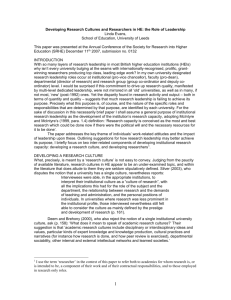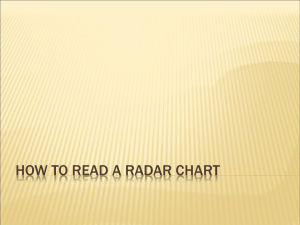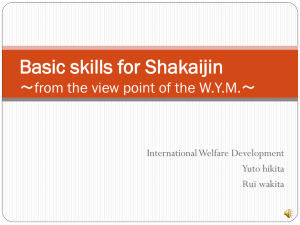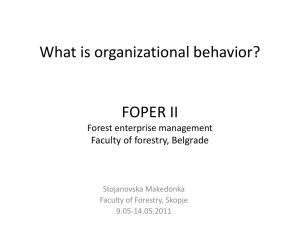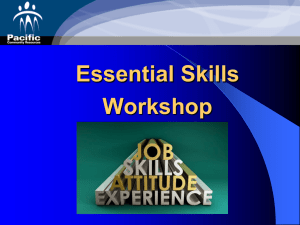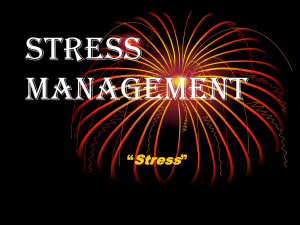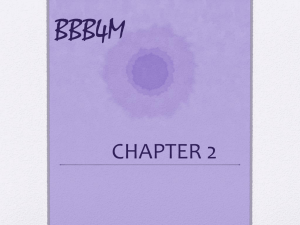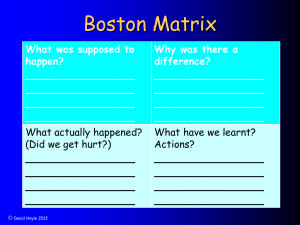AC13-A2-Professionalism
advertisement
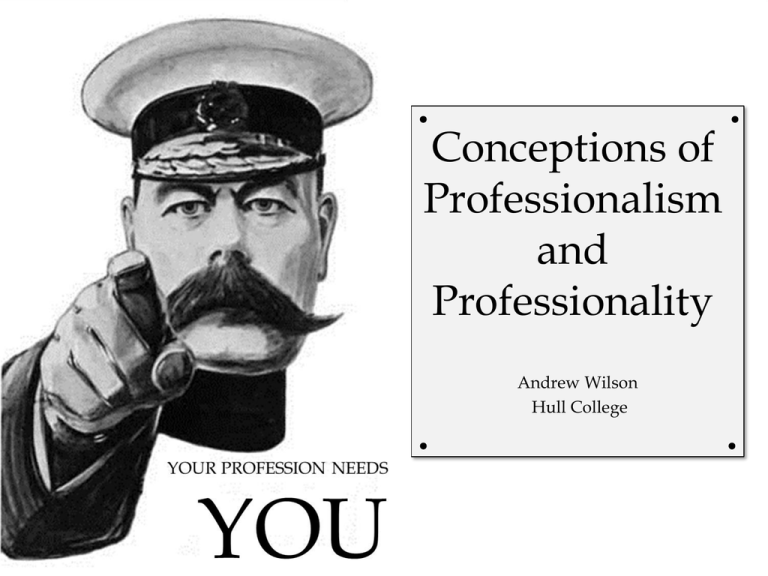
Conceptions of Professionalism and Professionality Andrew Wilson Hull College To discuss [It is] argued that professionalism is synonymous with quality and the current practices relating to maintaining and monitoring standards are issues of contentious debate. Warrior (2002) What is your view? What is a profession and what is a professional? What is your definition of profession and professional Problem? Is your view evidence or opinion based? Dictionary definitions Profession …an occupation requiring special training in the liberal arts or sciences, especially one of the three learned professions, law, theology, or medicine. Dictionary definitions Professional: of, relating to, suitable for, or engaged in as a profession engaging in an activity for gain or as a means of livelihood extremely competent in a job To what extent does your definition match the dictionary ones? Problem? Dictionary definitions are not the full story Most theorists indicate that working for the public good is a characteristic of a profession. Profession (Academic definition) …an occupation with a crucial social function, requiring a high degree of skill and drawing on a systematic body of knowledge. Sockett (1985:27) Models of Professionalism A number of theorists saw a profession as an organisation whose members satisfied specific and measurable criteria Millerson’s (1964) Model of Professionalism • A skill based on theoretical knowledge • Intellectual training and education • The testing of competence • Closure of the profession by restrictive organisation • A code of conduct • An altruistic service in the affairs of others Problem? …professionalism is not some socialscientific absolute, but a historically changing and socially constructed conceptin-use Holroyd (2000) Can we measure something that lacks a fixed meaning? Hoyle (1974) Hoyle & John (1995) Professionalism and Professionality Professionalism – strategies and rhetoric employed by members of an occupation to improve status, salary and conditions, and… Professionality – knowledge, skills and procedures employed by teachers in the process of teaching. Hoyle (1974) Hoyle & John (1995) Professionalism and Professionality Suggested 2 forms of professionality… …restricted and extended Restricted Professionality Extended Professionality Skills derived from experience Skills derived from a mediation between experience and theory Perspective limited to the immediate in time and place Perspective embracing the broader social context of education Workplace events perceived in isolation Workplace events perceived in relation to policies and goals Introspective with regard to methods Methods compared with those of colleagues and with reports of practice Value placed on autonomy Value placed on professional collaboration Limited involvement in non immediate professional activities High involvement in non immediate professional activities (eg networks, research, professional associations) Infrequent reading of professional literature Regular reading of professional literature Involvement in professional development limited and confined to practical courses Involvement in professional development considerable and includes learning of theoretical nature Work seen as an intuitive activity Work seen as a rational activity Restricted Professionality Extended Professionality Skills derived from experience Skills derived from a mediation between experience and theory Perspective limited to the immediate in time and place Perspective embracing the broader social context of education Workplace events perceived in isolation Workplace events perceived in relation to policies and goals Introspective with regard to methods Methods compared with those of colleagues and with reports of practice Value placed on autonomy Value placed on professional collaboration Limited involvement in non immediate professional activities High involvement in non immediate professional activities (eg networks, research, professional associations) Infrequent reading of professional literature Regular reading of professional literature Involvement in professional development limited and confined to practical courses Involvement in professional development considerable and includes learning of theoretical nature Work seen as an intuitive activity Work seen as a rational activity Restricted Professionality Extended Professionality Skills derived from experience Skills derived from a mediation between experience and theory Perspective limited to the immediate in time and place Perspective embracing the broader social context of education Workplace events perceived in isolation Workplace events perceived in relation to policies and goals Introspective with regard to methods Methods compared with those of colleagues and with reports of practice Value placed on autonomy Value placed on professional collaboration Limited involvement in non immediate professional activities High involvement in non immediate professional activities (eg networks, research, professional associations) Infrequent reading of professional literature Regular reading of professional literature Involvement in professional development limited and confined to practical courses Involvement in professional development considerable and includes learning of theoretical nature Work seen as an intuitive activity Work seen as a rational activity Restricted Professionality Extended Professionality Skills derived from experience Skills derived from a mediation between experience and theory Perspective limited to the immediate in time and place Perspective embracing the broader social context of education Workplace events perceived in isolation Workplace events perceived in relation to policies and goals Introspective with regard to methods Methods compared with those of colleagues and with reports of practice Value placed on autonomy Value placed on professional collaboration Limited involvement in non immediate professional activities High involvement in non immediate professional activities (eg networks, research, professional associations) Infrequent reading of professional literature Regular reading of professional literature Involvement in professional development limited and confined to practical courses Involvement in professional development considerable and includes learning of theoretical nature Work seen as an intuitive activity Work seen as a rational activity Restricted Professionality Extended Professionality Skills derived from experience Skills derived from a mediation between experience and theory Perspective limited to the immediate in time and place Perspective embracing the broader social context of education Workplace events perceived in isolation Workplace events perceived in relation to policies and goals Introspective with regard to methods Methods compared with those of colleagues and with reports of practice Value placed on autonomy Value placed on professional collaboration Limited involvement in non immediate professional activities High involvement in non immediate professional activities (eg networks, research, professional associations) Infrequent reading of professional literature Regular reading of professional literature Involvement in professional development limited and confined to practical courses Involvement in professional development considerable and includes learning of theoretical nature Work seen as an intuitive activity Work seen as a rational activity Restricted Professionality Extended Professionality Skills derived from experience Skills derived from a mediation between experience and theory Perspective limited to the immediate in time and place Perspective embracing the broader social context of education Workplace events perceived in isolation Workplace events perceived in relation to policies and goals Introspective with regard to methods Methods compared with those of colleagues and with reports of practice Value placed on autonomy Value placed on professional collaboration Limited involvement in non immediate professional activities High involvement in non immediate professional activities (eg networks, research, professional associations) Infrequent reading of professional literature Regular reading of professional literature Involvement in professional development limited and confined to practical courses Involvement in professional development considerable and includes learning of theoretical nature Work seen as an intuitive activity Work seen as a rational activity Restricted Professionality Extended Professionality Skills derived from experience Skills derived from a mediation between experience and theory Perspective limited to the immediate in time and place Perspective embracing the broader social context of education Workplace events perceived in isolation Workplace events perceived in relation to policies and goals Introspective with regard to methods Methods compared with those of colleagues and with reports of practice Value placed on autonomy Value placed on professional collaboration Limited involvement in non immediate professional activities High involvement in non immediate professional activities (eg networks, research, professional associations) Infrequent reading of professional literature Regular reading of professional literature Involvement in professional development limited and confined to practical courses Involvement in professional development considerable and includes learning of theoretical nature Work seen as an intuitive activity Work seen as a rational activity Restricted Professionality Extended Professionality Skills derived from experience Skills derived from a mediation between experience and theory Perspective limited to the immediate in time and place Perspective embracing the broader social context of education Workplace events perceived in isolation Workplace events perceived in relation to policies and goals Introspective with regard to methods Methods compared with those of colleagues and with reports of practice Value placed on autonomy Value placed on professional collaboration Limited involvement in non immediate professional activities High involvement in non immediate professional activities (eg networks, research, professional associations) Infrequent reading of professional literature Regular reading of professional literature Involvement in professional development limited and confined to practical courses Involvement in professional development considerable and includes learning of theoretical nature Work seen as an intuitive activity Work seen as a rational activity Restricted Professionality Extended Professionality Skills derived from experience Skills derived from a mediation between experience and theory Perspective limited to the immediate in time and place Perspective embracing the broader social context of education Workplace events perceived in isolation Workplace events perceived in relation to policies and goals Introspective with regard to methods Methods compared with those of colleagues and with reports of practice Value placed on autonomy Value placed on professional collaboration Limited involvement in non immediate professional activities High involvement in non immediate professional activities (eg networks, research, professional associations) Infrequent reading of professional literature Regular reading of professional literature Involvement in professional development limited and confined to practical courses Involvement in professional development considerable and includes learning of theoretical nature Work seen as an intuitive activity Work seen as a rational activity Restricted Professionality Extended Professionality Skills derived from experience Skills derived from a mediation between experience and theory Perspective limited to the immediate in time and place Perspective embracing the broader social context of education Workplace events perceived in isolation Workplace events perceived in relation to policies and goals Introspective with regard to methods Methods compared with those of colleagues and with reports of practice Value placed on autonomy Value placed on professional collaboration Limited involvement in non immediate professional activities High involvement in non immediate professional activities (eg networks, research, professional associations) Infrequent reading of professional literature Regular reading of professional literature Involvement in professional development limited and confined to practical courses Involvement in professional development considerable and includes learning of theoretical nature Work seen as an intuitive activity Work seen as a rational activity Where do you stand on Hoyle’s continuum? Restricted Extended Hoyle, Hoyle & John The extended form of professionality which goes beyond classroom skills to a wider range of knowledge and skills is seen as important. They identified three major problems in acquiring this wider range Problems? Time Teachers tend to obtain job satisfaction from classroom activities, with relatively little interest in educational theory/research. Question of how far they can gain further satisfaction and feel comfortable in challenging situation of extended professionality. Perception that extended professionality achieved at expense of effective restricted professionality – career orientation rather than expertise in teaching situation Is there an answer? Mastery of theoretical knowledge Capacity to solve problems Enthusiasm and commitment to stakeholders PROFESSIONAL COMPETANCIES Applying theoretical knowledge to practice Commitment to continuous learning Ability to create knowledge as well as possess it http://fashion-incubator.com/archive/howto-move-up-to-another-level Problem The teaching profession suffers from a vicious circle of low status, lack of competitive resources, inability to control their own selection, training and qualification, divided and consequently ineffective organisation and a degree of state interference and control suffered by almost no other profession all leading to low bargaining power, low remuneration and low status. (Perkin,1985) References Collins English Dictionary (7th Edition:2005) Harper Collins: Glasgow. Holroyd, C. (2000) Are assessors professional? Active Learning in Higher Education, 1(1), 28-44. Hoyle, E. (1974) ‘Professionality, professionalism and control in teaching’. London Educational Review,3 (2), Summer 1974, pp.13-19 Hoyle, E. & John, P, D. (1995) Professional Knowledge and Professional Practice, Cassell: London Millerson, G. (1964) The qualifying associations: a study in professionalization, Routledge & Kegan Paul: London. Perkin, H. (1985) The Teaching Profession and the Game of Life. In P. Gordon (1985) Is Teaching a Profession? University of London, Institute of Education, 12–25. Sockett, H. (1985) Towards a Professional Code in Teaching. In P. Gordon (1985) Is Teaching a Profession? University of London, Institute of Education, 26-43. Warrior, R. (2002) Reflections of an Education Professional. Journal of Hospitality, Leisure, Sport and Tourism. (1):2, 57 – 63.
